By Ann Scott Tyson
The Washington Post
BAGHDAD - Nearly three months after the U.S. military launched a new strategy to safeguard Baghdad's population by pushing American and Iraqi forces deeper into the city's neighborhoods, defending their small outposts is increasingly requiring heavy bulwarks reminiscent of the fortress-like bases that the U.S. troops left behind.
To guard against bombs, mortar fire and other threats, U.S. commanders are adding fortifications to the outposts, setting them farther back from traffic and arming them with antitank weapons capable of stopping suicide bombers driving armored vehicles. U.S. troops maintain the advantage of living in the neighborhoods they are asked to protect, but the need to safeguard themselves from attack means more walls between them and civilians.
At a moonlit outpost on the edge of Baghdad's Sadr City one night last week, 1st Sgt. Donald Knapp balanced himself on a concrete barrier suspended by a crane and slowly guided a heavy slab into position. It was 3 a.m., and Knapp and a few other soldiers were working through the night to fortify their camp.
Over four days, the soldiers erected hundreds of sections of wall and reinforced them with barbed wire and 300 truckloads of sand. They pushed out the walls of the camp, known as a joint security station, and blocked approaching roads with serpentine barriers. "When the guys get time to sit down, they sleep," said Knapp, a sniper from Milan, Ind., as soldiers in dusty T-shirts labored nearby.
Knapp's unit from the 82nd Airborne Division is redoubling security efforts as insurgents and militiamen step up attacks on their outpost, one of the dozens of small patrol bases set up as part of the deployment of tens of thousands of additional U.S. and Iraqi troops. The strategy has reduced sectarian killings, but has also put U.S. troops at greater risk, such as when a suicide bombing at an outpost east of Baghdad killed nine U.S. soldiers and wounded 20 on April 23.
'There's no commuting to the fight'
Army Gen. David H. Petraeus, the top U.S. commander in Iraq, has acknowledged that U.S. troops will face opposition as they move into neighborhoods. "It's a fight. They're fighting to hold a grip on the population, and the Iraqis and coalition are working to break the grip," he said in an interview last month. Still, he said, the outposts are vital to his counterinsurgency strategy. "If you want to protect the population, you've got to live with it," he said. "There's no commuting to the fight."
More than 60 joint security stations, staffed by American and Iraqi forces, and U.S. combat outposts are now operating in Baghdad, leading to an increase in the discovery of weapons caches, a U.S. military spokesman, Maj. Gen. William B. Caldwell, said Monday.
"There's two threats to the combat outpost . . . a huge truck bomb, and indirect fire," Lt. Gen. Raymond T. Odierno, who handles day-to-day military operations in Iraq, said in an interview at his Baghdad headquarters last week. In response, he said, U.S. troops are building more walls to shield themselves from mortars and rockets, while trying to track down insurgents firing on them.
To counter truck bombs, military engineers are gauging the structural soundness of the outposts and making sure they are well removed from traffic, Odierno said. Antitank weapons such as the bazooka-like AT-4 are also now required for soldiers on guard.
"They are now armoring these trucks, so whereas before we could shoot them and kill them, now we have to use some antitank capability against them and we're going to do that," Odierno said.
For U.S. troops living at the small camps, the constant need for vigilance — coupled with hardship conditions and the prospect of 15-month tours — has in some cases taken a toll on morale. While some soldiers see advantages in living alongside Iraqi security forces inside the neighborhoods they patrol, others voice resentment over a mission they believe is ill-defined.
Living between the explosions
At the outpost in Sadr City, a volatile predominantly Shiite Muslim district of east Baghdad with about 2 million residents, scores of Iraqi police officers and U.S. soldiers live in cramped quarters in a two-story building that serves as a joint security station. They eat mostly packaged food, rarely shower, and in off-duty hours do little but sleep. U.S. troops staff guard towers on the roof 24 hours a day and, uncertain of the loyalties of their Iraqi counterparts, also stand sentry at the American section inside.
One recent afternoon, a rocket landed nearby, followed a short while later by gunfire and then two more explosions.
"Okay, let's find out about this explosion. I need to know right away if that was a VBIED or an IED," Capt. Frank Fisher told the Iraqi police commander, using abbreviations for car bomb and roadside bomb, as they scanned a map in the operations center. "You need to call these checkpoints," Fisher said, prompting the commander to get on the radio.
Fisher, 37, of Dryden, Mich., said that by living in Sadr City he can respond much faster to incidents than if he stayed on a large outlying military base, as U.S. forces did in the past. "We hear a boom somewhere in the city and within minutes or seconds I can get an indication of where that explosion happened," said Fisher. "Every time I step out of the base I'm in my own battle space. It pays big rewards when people see you in their neighborhood every day," he said.
But U.S. troops also face a constant, nerve-racking battle against insurgents attacking with mortars, gunfire and sometimes car bombs. Every day at different times, Knapp has to vacate U.S. personnel and vehicles from different parts of the security station to avoid incoming 60mm and 80mm mortar rounds. As Knapp and other soldiers put up barriers recently, five rocket-propelled grenades and several mortar shells were fired at Iraqi contractors lined up just outside with trucks and other equipment. Two truck drivers were reportedly kidnapped at gunpoint, and as a result, "a very large percentage of the contractors quit" and had to be replaced, said Capt. Joshua Taylor.
In some areas, U.S. commanders are considering relocating outposts deemed overly vulnerable.
Lt. Col. Dale C. Kuehl oversees three camps set up since February in western Baghdad's Mansour area, and said he plans to move one of them to a more secure location. "I've never been real comfortable with the IP station," or Iraqi police station, said Kuehl, commander of the 1st Battalion, 5th Cavalry Regiment, 1st Cavalry Division, who has ordered that a tank or Bradley Fighting Vehicle barricade the front at all times. "It's been probed a couple of times," Kuehl said, noting that there are several routes leading into the station.
U.S. troops living at the station are attacked "every couple of days," said Staff Sgt. Raymond Dias, 26, of Silver Springs, Tex., as he checked on guards on the station roof.
Living at the outposts is "different — it's a risky thing," acknowledged Kuehl. He stays most nights at another joint security station that lacks a wide perimeter and is nestled in a neighborhood where gunfire sounds sporadically throughout the night. One recent evening, soldiers on guard unpacked new antitank weapons, shouldering the tubes that can fire armor-piercing rounds from a short range.
"We don't have 200 meters of standoff" distance, Kuehl said in his spartan room at the camp. "But they have to go through 300 meters of fire to get at us."
Minimal comforts
Conditions at the camp are austere. "We just got port-a-potties. That was a big step up," said Spec. Peter Lahoda, 22, of Pittsburgh, recalling the "burn barrels" he had used to dispose of human waste at the base since February. Lacking showers, some soldiers rely on baby wipes while others clean themselves with hand sanitizer. They eat chicken and rice most days, and sleep on bunk beds in a large, dark, windowless room that they share with stray cats.
While not patrolling or on their eight to 10 hours of daily guard duty, soldiers at the base entertain themselves by playing poker or invented games.
One favorite is "Icom charades," where soldiers on radios quiz themselves on pop music bands or lines from movies.
Another is "Kevlar bowling." "We got 10 water bottles and filled them with dirt and taped them up," said Pfc. Ray Queen of Fort Worth, during a break from guard duty. "Then we get an old Kevlar [helmet] we don't use and see how many we can knock over."
Morale was mixed among soldiers at the outposts — the closest thing to a "front line" in the military's Baghdad campaign. Some, particularly junior officers, said they accepted the risks to live closer to the Iraqi people. Others, however, said they longed for a sense of purpose and voiced frustration at the prospect of harsh, dangerous 15-month tours for a mission they consider murky.
"What do you want us to accomplish over here? We aren't hearing any end state. We aren't hearing it from the president, from the defense secretary," said Sgt. 1st Class Michael Eaglin in a room cluttered with bunk beds, rucksacks and weapons at the Sadr City outpost. "We're working hard and the politicians are arguing. They don't have bullets flying over their heads. They aren't on the front lines and their buddies aren't dying," he said, echoing the sentiments of a group of soldiers around him.
"It's almost like the Vietnam War. We don't know where we're going," agreed Spec. Adam Hamilton.
"We're not complaining," said Eaglin. "We're tired of being lost. Have you ever been lost and at the same time getting shot at? It's miserable," he said. "When you paint a car a pretty red . . . it makes you feel good inside. That's what we want with this war. I want to be here for a reason, not just a show of force."
© 2007 The Washington Post Company
Tuesday, May 8, 2007
Subscribe to:
Post Comments (Atom)
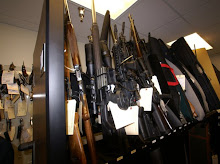
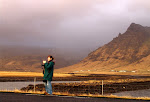
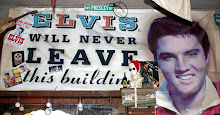


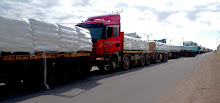
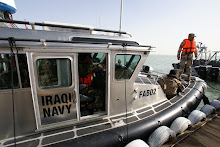

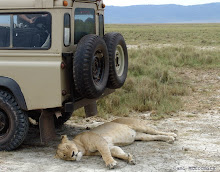
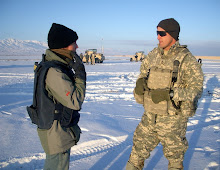



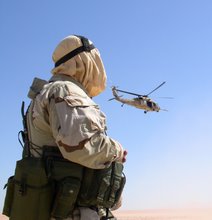
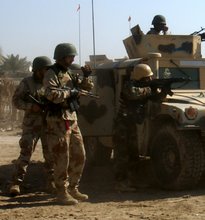
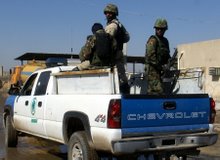
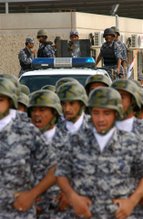
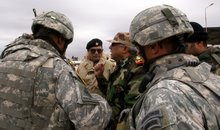
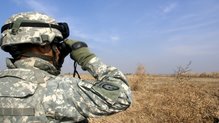
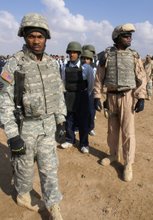


No comments:
Post a Comment